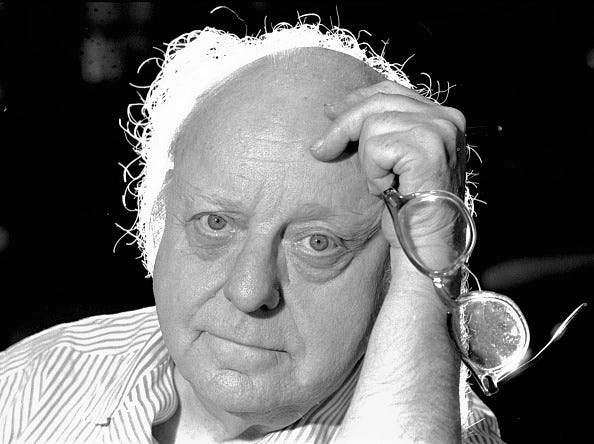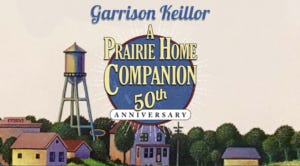The Writer's Almanac from Saturday, November 25, 2017
“At the Lake House” by Jon Loomis from The Mansion of Happiness. © Oberlin College Press, 2016
ORIGINAL TEXT AND AUDIO - 2017
Today is the birthday of American composer Virgil Thomson (1896). He grew up in Kansas City, Missouri, on a steady diet of church music, Civil War Songs, the blues, and barn-dance music. Starting when he was five, a cousin gave him piano lessons. Later, he frequently accompanied showings of silent films.
Thomson is best known for collaborating on operas with avant-garde writer Gertrude Stein, like Four Saints in Three Acts (1934), which featured an all-black cast and caused an immediate sensation at its premiere, and The Mother of Us All (1947). Thomson met Stein in 1921, in Paris, where he’d gone on a fellowship after touring with the Harvard Glee Club. He felt his music worked well with her poetry because, “Poetry alone is always a bit amorphous […] and poetry as spontaneously structured as Gertrude Stein’s had long seemed to me to need musical reinforcement. I do not mean that her writing lacks music; I mean that it likes music.”
In Paris, Thomson quickly fell in with the art and literature crowd, befriending Pablo Picasso, James Joyce, and Ezra Pound, though he always disdained the “Lost Generation” nickname the group earned. He scoffed, “We were no more lost than any other group of people is at any time.” He referred to the nickname as “personal publicity for Ernest Hemingway.”
Virgil Thomson received a Pulitzer Prize for composing the music for the film Louisiana Story (1948). It’s the only film score to ever win that prize. He died in 1989. He had a famous habit of falling asleep and snoring during live musical performances, but insisted he always woke up if something interesting happened.
When an interviewer asked Virgil Thomson if opera should be considered art or entertainment, he answered, “It better be both if it’s going to be any good.”
It’s the birthday of American physician, poet, and science writer Lewis Thomas, born in New York City (1913). Lewis was best known for poetic, philosophical, and insightful essays that explained the mysteries of biology and medicine to ordinary people. His books include The Lives of a Cell (1974) and The Medusa and the Snail (1974). He once lobbied for sending the music of Johann Sebastian Bach into outer space, writing: “I would vote for Bach, all of Bach, streamed out into space, over and over again. We would be bragging of course but it is surely excusable to put the best possible face on at the beginning of such an acquaintance. We can tell the harder truths later.”
Thomas’s father was a doctor and his mother was nurse; he grew up accompanying his father on house calls. He had a good childhood, ringing doorbells and running (to prank his neighbors), and scrawling on the sidewalk with chalk. He followed his parents into medicine and somewhat stumbled into writing after spending 30 years as a researcher and medical administrator. He wrote a paper on inflammation and The New England Journal of Medicine liked it so much they offered him a regular column. He started writing a monthly column called “Notes of a Biology Watcher” and novelist Joyce Carol Oates became a big fan, urging him to put together a collection of essays. He did, and those essays became The Lives of the Cell, which went on to win a National Book Award.
His books include The Youngest Science (1983), Late Night Thoughts on Listening to Mahler’s Ninth Symphony (1983), and Could I Ask You Something? (1984).
Lewis Thomas wrote: “The recorded songs of the humpback whale, filled with tensions and resolutions, ambiguities and allusions, incomplete, can be listened to as a part of music, like an isolated section of an orchestra. If we had better hearing, and could discern the descants of sea birds, the rhythmic timpani of schools of mollusks, or even the distant harmonics of midges hanging over meadows in the sun, the combined sound might lift us off our feet.”
It’s the birthday of Shelagh Delaney, a playwright and screenwriter born in 1938 in Salford, England.
Delaney disliked school and might have spent her life working menial jobs. One of those jobs, however, was that of an usher at a theater, where she saw a production of Waiting for Godot by Samuel Beckett, which inspired her to borrow a typewriter. She locked herself up and quickly wrote her first play. Delaney submitted A Taste of Honey to a director, and the play opened at the Theatre Royal when its author was 19 years old.
The play featured a working-class white teenager in the north of England who gets pregnant while in a relationship with an African sailor, and is then consoled by a gay friend. While some viewers dismissed the work as “sordid,” other critics loved it. One wrote that A Taste of Honey was “the first English play I’ve seen in which a coloured man and a queer boy, are presented as natural characters, factually without a nudge or shudder.” Another critic called the work just as “fresh” and even more mature than John Osborne’s Look Back in Anger.
Delaney continued to write plays, fiction, and work in film, radio, and television. Her career was prolific and diverse, although none of her later productions approached the popularity of A Taste of Honey. In her teens, Delaney wrote this line for one of the play’s characters: “Women never have young minds. They are born three thousand years old.”
It’s the birthday of the playwright Murray Schisgal, born in 1926 in Brooklyn, New York. Schisgal has written more than 50 plays, known for their absurdist humor. His most famous play, Luv, debuted in 1964 and was his only major Broadway hit. He also co-authored the screenplay for the wildly successful 1982 film Tootsie, for which he won many awards.
A high school dropout, Schisgal worked as a radio operator in the Navy during World War II before finishing his education by attending night school. He earned a law degree, worked as a lawyer, and taught junior high English in East Harlem.
Schisgal’s plays often lampoon American fads, including commodity culture, the environmental movement, fashionable malaise, and sexual liberation. Luv took aim at exaggerated self-pity, featuring three characters’ melodramatic suicide attempts. According to one critic, the playwright’s protagonists highlight the American tendency to go around “wrapped in a cloak of borrowed pain.” Another critic said: “Mr. Schisgal doesn’t necessarily deny that things are tough all over; he just sees how preposterous it is that we should take such pleasure in painting the clouds black. If the avant-garde, up to now, has successfully exploded the bright balloons of cheap optimism, Mr. Schisgal is ready to put a pin to the soapy bubbles of cheap pessimism.”
On this day in 1986, Attorney General Edwin Meese revealed that proceeds from secret arms sales to Iran were illegally diverted to support Contra rebels in Nicaragua. Three weeks earlier, a Lebanese magazine had broken the story that the United States — in violation of its own arms embargo — had sold weapons to Iran in an attempt to gain freedom for American hostages being held in Lebanon. Because President Reagan had publicly stated that he would never negotiate with terrorists, it came as a shock to the American public when his administration admitted to doing just that.
To make things even worse, in 1982 Congress had passed the Boland Amendment, which specifically prohibited sending federal money to the Contra rebels for the purpose of overthrowing the Nicaraguan government. Meese’s revelation that the money from the arms sales was used to support a guerilla war against the leftist Nicaraguan government infuriated Congress. The day that the news broke, Reagan’s National Security Advisor, John Poindexter, resigned. His aide, Lieutenant Colonel Oliver North, was fired.
The following summer, Congress held hearings on what had become known as “the Iran-Contra affair.” Eleven administration officials were found guilty of a number of charges ranging from perjury to conspiracy. Reagan accepted responsibility for the arms sales, but denied any knowledge of the Nicaragua piece, and it has never been established exactly what his role was in the conspiracy. Notes from 1985, taken by then-Defense Secretary Caspar Weinberger, recorded that Reagan said that he could answer charges of illegality, but not the charge that “big strong President Reagan passed up a chance to free hostages.”
Be well, do good work, and keep in touch.®
A PRAIRIE HOME COMPANION 50TH ANNIVERSARY SHOW is a two-hour performance celebrating the upcoming half-century milestone of Garrison Keillor’s one-of-a-kind radio broadcast, which first hit the airways in July of 1974. Click here to see if we’ll be in a city near you!





